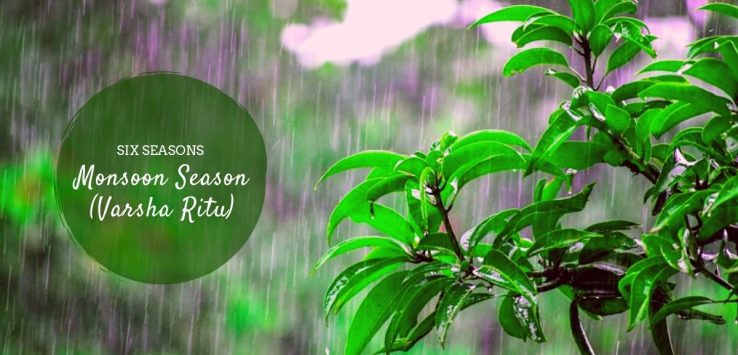How many of you love the smell of the earth when it becomes wet from the rains? Monsoon season is one of the charming seasons in India. All you want to do is wander in the cold breeze and have a hot cup of tea. But, Varsha Ritu (rainy season) also brings humidity, mud, and roads filled with water. It can be depressing for some people. The monsoon weather is called Varsha Ritu, according to Ritucharya in Ayurveda.
Monsoon Season (Varsha Ritu)
Rainy season in Hindi is called Varsha Ritu. It falls under the Visarga Kaal. The monsoon weather begins in the month of Shravan (mid-July) and ends in Bhadrapada (mid-September). The heat from the land accumulated in the Greeshma Ritu (Summers) is released, and it starts to rain. Initially, the earth smells fresh, but gradually, the environment becomes damp.
The dampness turns into a host of bacterial as well as viral infections. The monsoon weather also affects your body’s immunity which increases the probability of Kapha related ailments. Kids suffer from cold and cough along with food poisoning after eating unhygienic food, and skin infections from bathing in the rain.
So, how to stay safe? There are some Ayurveda recommended dietary and lifestyle tips to prevent concerned ailments.
Diet
- Avoid foods that are difficult to digest, especially bitter and astringent foods.
- Frozen food and desserts are bad for health.
- Ginger tea is ideal in the monsoon season.
- Drink warm water in the rainy season regularly.
- Add honey to make drinks or juices sweet.
- Eat fennel seeds after meals to aid digestion and freshness in the mouth.
- Avoid eating green leafy vegetables as they may contain worms and insects in Varsha Ritu.
- Do not consume meat as the chances of flu increases during the rainy season.
Lifestyle
- Do not sleep in the afternoon. It slows down the digestive process.
- Avoid tough workout in the rainy season.
- Wear light and dry clothes.
- Stay dry and change to dry clothes if you get wet.
- Take an oil massage before bath. Let the bath water be warm.
- Do not overindulge in sexual activities.
- Carry an umbrella wherever you go. Try to keep extra clothing in case you drench in the rainwater.
- Ensure there is no stagnant water in your surrounding. Mosquitoes breed in stagnant waters.
- One tends to become lazy in the monsoon season. So, practice quick and easy yoga asana to stay energetic.
Note: Articles on Ayurvedum are solely for the purpose of sharing the goodness of Ayurveda and bringing awareness on natural and healthy living. Please do not substitute it for professional medical advice. Ingredients discussed can interfere with certain medications. So, before using anything to treat yourself, always consult an Ayurveda doctor or practitioner.






Leave a Reply